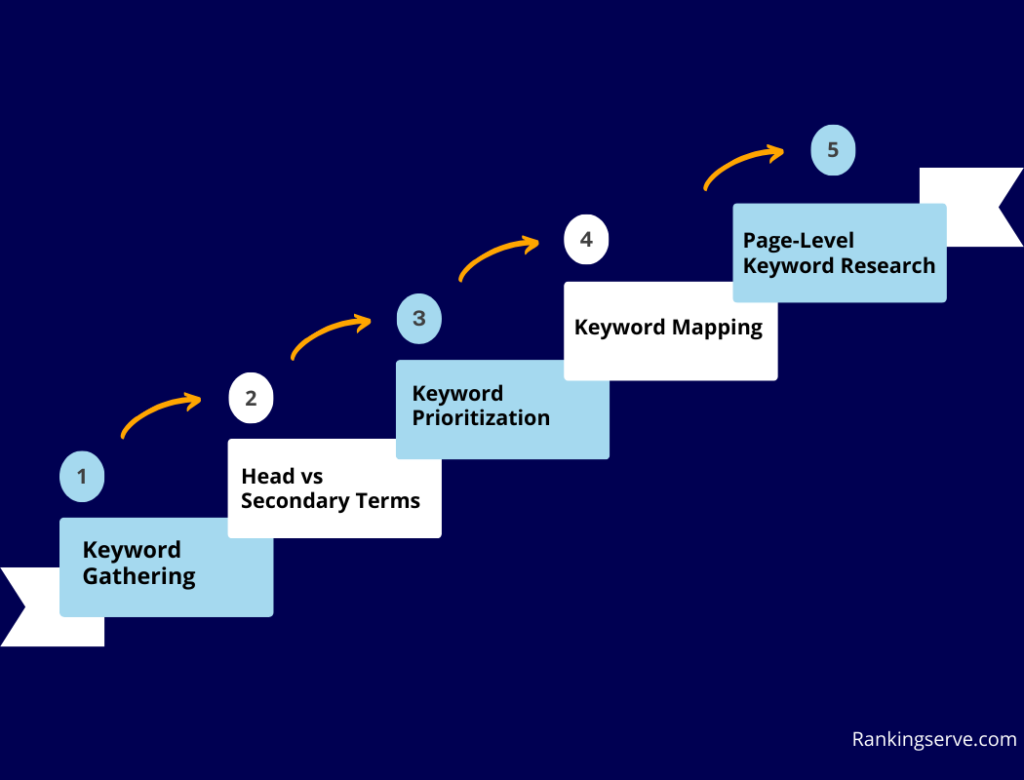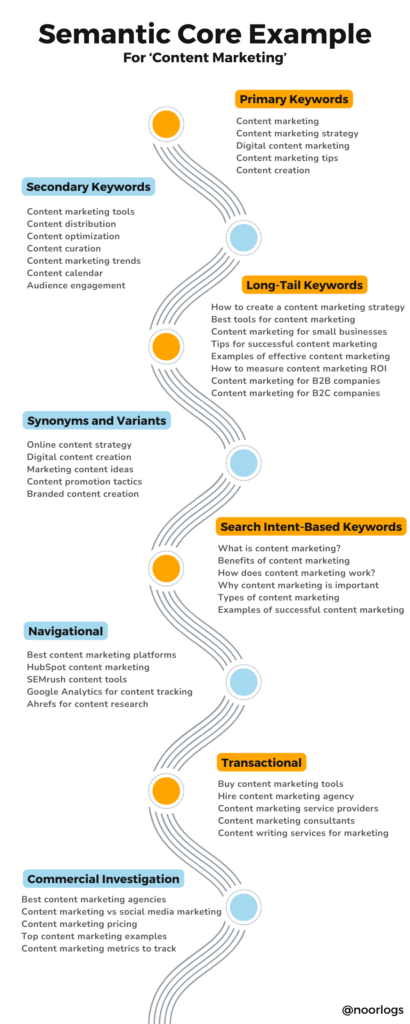SaaS Keyword Research in 2025: How to do Step by Step
SaaS (Software as a Service) companies need to carefully target the authentic audience in the competitive digital market world today. Semantic keyword research is one of the best ways to accomplish this.
By connecting with potential clients in their buying period, this approach not only improves your search engine results but also generates high-quality traffic to your website. From this blog, you can learn How to conduct SaaS Keyword Research, improve your SEO approach, and set up your SAAS company for long-term success. At the end of this article, I’ll share my secert manaul keyowrd research strategy how I find the most relevant keywords.
What is SaaS Keyword Research?
SaaS keyword research is determining and examining the search keywords that potential clients of your software use to find the solutions that they need. Keywords provide insights into user purpose and online activity, not just words or phrases.
Your SEO efforts can be built or ruined based on keywords, also influencing whether or not your target audience notices your website. Keywords might be individual terms (like “CRM”) or lengthier expressions (like “best CRM software for small businesses”). Finding the right balance between search volume and keyword specificity is crucial.
Higher search volume can increase publicity but more specialized keywords frequently lead to less competition and more targeted traffic. Using the appropriate keywords increases the likelihood that your content will appear in search results and that your audience will interact with it.
Step-by-Step Process for Performing SaaS Keyword Research
Step 1: Keyword Gathering
Getting a list of possible keywords is the first stage in any keyword research process. Here’s how to accomplish it:
Start with competitor analysis– Look into the keywords that other companies are ranking for. You can gain a competitive edge by competitor analysis their SEO strategy with tools like Ahrefs or SEMrush.
Consider brainstorming— Make a list of possible subjects related to your SaaS offering. Consider the characteristics that your customers could be looking for or the ways in which they explain their pain concerns.
Then use SEO tools such as SEMrush, Ahref, Moz, Google Auto Suggest, Google Trends, Answer the Public, and Google Keyword Planner to find relevant queries, ideas, and patterns. Check seasonal trends and observe how search volumes change at different periods of the year. For instance, during tax season, firms might look for new accounting software.
Step 2: Head Terms vs. Secondary Terms
After compiling a list of relevant keywords, you must group them into the following categories:
- Head Terms: These are widely used, highly competitive keywords with high volume (e.g., “CRM software”). Even if they can draw a substantial crowd, they might not be very specific.
- Secondary Terms: Long-tail keywords that are more specialized and target particular markets, such as “cloud-based CRM for startups” These frequently yield higher conversion rates despite having lesser search volume.
Step 3: Keyword Prioritization
After grouping your keywords, it’s time to rank them. A few things to think about are relevance that is this keyword compatible with the SaaS products you offer? Then search volume that each month, how many people look up this term online? This information can be obtained with tools such as Ahrefs.
Also, cost-per-click (CPC) data can assist you in determining the commercial purpose underlying a keyword even if you are not running advertisements.
Make funnel stage! Create a keyword map that corresponds to the awareness, consideration, and decision phases of the buyer journey. “Best CRM for B2B companies” would be appropriate for the decision stage, whilst “What is CRM software?” could be more useful for the awareness stage.
Step 4: Keyword Mapping
Assigning keywords to particular pages on your website is known as keyword mapping. By taking this measure of caution, you can be confident that you aren’t keyword cannibalizing—targeting the same term on different sites.
Here are the points to consider– optimize existing pages. Verify if the content on your current pages ranks for the term. If so, make changes to it instead of starting a new page. Plus, make new content, if there isn’t a page that meets the keyword, create new material specifically for it.
Step 5: Page-Level Keyword Research
For more precise optimization, carry out keyword research at the page level following mapping. Analyze the content that is currently ranking for your target keywords on search engine results pages, or SERPs. Do these pages have landing pages, tutorials, or blog posts?
Determine which keywords are very competitive and where your material could offer a different perspective or additional value. Verify that there are enough monthly searches for the keyword to make targeting effective.

Keyword Research Tips for SaaS Businesses
1. Target the Buyer’s Journey
Make an effort to match your keywords to the buyer’s direction. Choose keywords for the awareness stage that answer general inquiries. Take into account feature comparisons and benefits. Use precise language about the unique selling point of your product while making decisions.
2. E-A-T and Expertise
E-A-T (Expertise, Authority, and Trust)-based material is given precedence by Google. Employ keywords that demonstrate your industry knowledge and create your authority. Incorporating case studies, certifications, or client testimonials can help establish credibility.
3. Guide Content Creation
Make sure your content approach reflects search intent by conducting thorough keyword research. Conduct frequent updates for your content to take advantage of shifts in market trends and search engine behavior.
Implementing a Content Marketing Strategy
1. Create a Content Calendar
Make a content calendar that plans the creation of blogs, landing pages, and other material forms that are optimized for search engines based on your keyword analysis. To optimize engagement, make sure to vary the types of information you publish (e.g., films, case studies, infographics).
2. Continuous Analysis
SEO is a continuous activity. Keep a close eye on your rivals and modify your keyword approach accordingly in response to emerging trends, new rivals, or changes in audience behaviour.
Semantic Core
Semantic Core also know as keyword clusters should be the foundation of your SEO strategy. It’s a structured list of keywords and phrases, covering all essential topics around your products/services—helping you match user intent and stay competitive.
Why It Matters:
Better Rankings – Target the right keywords to boost visibility.
Focused Traffic – Draw visitors who are genuinely interested, leading to more conversions.
Competitive Edge – Analyze competitors’ keywords to spot opportunities.
User-Centric Content – Satisfy search intent and improve user experience.
I started building a semantic core around different topics for one of my clients in 2022. The results? More visibility, more targeted traffic, and better user engagement! The client’s website is getting 1 Million+ visitors per month these days.
Here’s exactly what I did:
Research the Keywords: I brainstormed and used tools like Google Autosuggest, Surfer SEO, and SEMrush to find high-potential keywords that align with my audience’s needs.
Group & Cluster: I organized keywords by themes, distinguishing between primary, secondary, and long-tail keywords. This created a clear roadmap for future content.
Align with Intent: I focused on user intent, ensuring keywords matched informational, transactional, and navigational searches, so content hit the mark with users.
Track & Tweak: After implementing the changes, I used Google Search Console and Google Analytics to track performance and made adjustments based on what worked best.
Here is an example of a semantic core for the ‘content marketing’ topic:

SaaS Keyword Research Tools
To do SaaS keyword research, you’ll need the essential tools. Discover the precise search terms bringing visitors to your website and find new keyword opportunities with Google Search Console.
A thorough tool offering information on search volume, competitive analysis, and keyword difficulty. It aids in locating possibilities and content gaps as well.
To help you find content possibilities that specifically address client pain points, Answer the Public generates similar questions and phrases based on your keyword.
Here are some other prominent tools:
- SEMrush
- Ahref
- Surfer SEO
- SERanking
- Google Autosuggest

How to do Keyword research manually without any tool for Free?
You can do keyword research without any paid tool. All you need Goole and a SEO Surfer Chrome extension. You can simply put your seed keyword in Google search bar and check the suggestions. Google use AI and NLP to suggest ideas for relevant keywords that your target audience are searching on Google.
I’ll try with “Keyowrd Research” and let see what other ideas we can get through Google auto suggets.
Next, I can add space or some alphabets in the beginning of “keyowrd research”. I’ll try with alphabet “a”, and here are the resutls:
Next, you can add other alphabets, like b,c,d, and so on to get more ideas. Even you can try * sign to see more suggestions:
Similarly, if I search “Keyword Research without tool”, I got following keowrd ideas in auto suggestions.
Now, you will SEO Surfer Chrome Extension to to check search volume for each keyowrds. You can choose any keyword from suggestion and see the search volume right in your browser.
Through Surfer Chrome Extensin, you can can get more idea abou your main topic in the right sidebar of yoru browswer.
Google Related Searches
You can also get keyword ideas in the “related searches” section of search result page. Search your primcary keyword or main topic in the browswer and scroll down right to the bottom.
Final Thoughts
Researching SaaS keywords is essential to any effective SEO plan. Through keyword research and analysis, you can optimize your website to draw in high-quality traffic and turn visitors into paying clients. Keep in mind that keyword research is a continuous process, so be prepared to modify and improve your plan whenever new information becomes available.
It’s your turn now! Put these keyword research strategies into practice to grow your SaaS company. Don’t be afraid to ask for professional advice from SEO specialists if you need it. They can help you match your keyword approach to your company’s objectives.
FAQ’s
- How do you run a keyword research?
After coming up with a list of potential keywords, examine search volumes and competition using resources like Ahrefs or Google Keyword Planner. Prioritize keywords according to search intent and relevancy by grouping them into head phrases and long-tail keywords. Lastly, map these keywords to particular sites for search engine optimization.
- What is SaaS SEO?
SaaS SEO is the process of improving a SaaS website’s search engine rankings for appropriate keywords. It entails focusing on various phases of the buyer’s journey and offering insightful content to draw in and win over clients. Creating leads and organic traffic is the aim.
- What is SaaS content strategy?
Planning and producing content for potential consumers at different phases of their buyer journeys is a key component of SaaS content strategy. It draws in, informs, and converts leads with captivating, keyword-optimized formats including case studies, videos, and blogs. Providing worthwhile and pertinent content is the main goal.
- What are the 5 C’s of SaaS?
The following five C’s are essential KPIs for SaaS growth and profitability: Cash flow maintains business stability, Churn gauges customer retention, and CMRR (Committed Monthly Recurring Revenue) tracks predictable revenue. Long-term profitability is highlighted by CLV (Customer Lifetime Value), whereas CAC (Customer Acquisition Cost) measures marketing effectiveness.
What is keyword research?
Keyword research is the process of identifying words and phrases that people use when searching online. It helps you understand which topics are popular and relevant to your audience. By targeting these keywords, you can create content that ranks higher in search engines. This can increase your website’s visibility and attract more organic traffic, which is crucial to SEO success.
What is the best keyword research technique in SEO?
The best keyword research technique in SEO is to use a combination of tools and methods. Start by using tools like Google Keyword Planner and Ubersuggest to find popular keywords. Analyze your competitors’ websites to see which keywords they rank for. Focus on long-tail keywords and consider the search intent behind them for better targeting.
What is the best way to do keyword research to help with site SEO?
The best way to conduct SEO keyword research is to use a tool like Google Keyword Planner or Ahrefs to find popular related keywords. Focus on long-tail keywords with low competition and high search volume. Check your competitors’ keywords and choose those that match your content and audience.
What is the best SEO tool to find useful and valuable keywords?
The best SEO tools for finding useful and valuable keywords are Ahrefs and the free tool Google Keyword Planner. Ahrefs provides detailed keyword data such as search volume and competition, while Google Keyword Planner provides keyword ideas and insights for free. Both can help you find the right keywords for your content.
What is semantic keyword research?
Semantic keyword research is looking for related keywords and phrases related to your main keyword. It helps search engines understand the meaning behind the content, improving SEO by targeting broader topics and user intent rather than just single keywords.
Why is keyword research so important to boost any blog post?
Keyword research is important for improving the quality of your blog posts because it helps you target the right search terms that people are looking for. This improves your chances of ranking higher in search results, thereby driving more traffic to your blog. It also ensures that your content matches your audience’s needs.
Which local keyword research tools are the most useful?
The most useful local keyword research tools are Google Keyword Planner, Moz Local, and BrightLocal. They can help you find location-specific keywords and analyze local search trends. These tools can increase your visibility in local searches, thereby driving targeted traffic. They are essential for promoting local SEO.
How do I do keyword research manually without any tool for Free?
You can do keyword research without any paid tool. All you need Goole and a SEO Surfer Chrome extension. You can simply put your seed keyword in Google search bar and check the suggestions:
Is Google Keyword Planner a reliable tool for organic keyword research?
Yes, Google Keyword Planner is reliable for organic keyword research. It provides accurate search volume and keyword suggestions. However, it was primarily made for advertising, so the data may not be as detailed for SEO. Other tools may provide additional insights into organic search.
Semrush Vs Ahref, Which one is best for keyword research tools?
Both Semrush and Ahrefs are great for keyword research, but Semrush is better for detailed keyword analysis and competitor insights, while Ahrefs is better for backlink data and keyword difficulty analysis. Your choice depends on your specific needs.
What is the best chrome extension for keyword research?
The best Chrome extensions for keyword research are keywords Everywhere and Keyword Surfer. Keywords Everywhere displays search volume, cost-per-click (CPC), and competition on search results. Keyword Surfer provides similar data and also displays keyword suggestions and content ideas, making both tools helpful for SEO and content creation.

